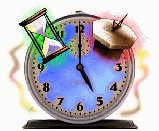
Time is the element in which we exist. ... We are either borne along by it or drowned in it.
Much can be made of Bob Dylan's "the times, they are a changin'." According to William Irwin Thompson, we're now AT THE EDGE OF HISTORY, buffeted about by John Naisbitt's MEGATRENDS, and with millions suffering from Alvin Toffler's FUTURE SHOCK. In the lifetime of one born in 1976, America's bicentennial year, the population of the world has increased by over one and one-half billion individuals, hundreds of thousands have died in the name of nationalism or religion, trillions of dollars have been spent perfecting doomsday weaponry, and the revolutions in minority, gender, and old age relations have shaken the traditional foundations of social life. To make matters even more interesting, we are told that the pace of such change is accelerating. And with people living ever longer, the historical changes that used to be absorbed by several generations now must be coped within a single lifetime. Largely forgotten are the principles and values on which society's oldest members based their lives.
With the accelerating push forward generated by technological and scientific innovations, the future is supposedly coming closer. However, as a society, we seem unable to conceive of great enterprises--like the medieval construction of the great cathedrals of Europe--that can link generations together into a common project spanning several centuries. Simultaneously, the past--the wake in the water produced by the bow of the future and the hull of the present--is growing longer, thanks to technology replacing personal memories: on celluloid for instance, we can see and hear George Bernard Shaw--a man born a decade before the outbreak of the American Civil War--talk to us about first hand experiences with the Victorian sexual mores. Ironically, the extent of our historical ignorance is considerable, and by all accounts growing.
This page is devoted to the study of time and the various timetables and rhythms that shape our behaviors and thoughts. Here we will consider such issues as:
Time is the container of our social activities, especially in our monochronic culture where we have specific times for doing specific things (as opposed to more polychronic cultures, where many different things are done simultaneously). These time-specific activities flavor the meanings we associate with the various times of the day, week, and year. On the other hand, these time containers have a way of flavoring their activities as well. An evening college class, for instance, has an entirely different feeling than its daytime counterpart by virtue of the meanings and activities associated with night hours.
Even though these times of our lives seem to be as "natural" as as any physical object in our social universe, the fact is that most are totally man-made notions. Why do we have 60 seconds in a minute and 60 minutes in an hour? Because the Babylonians had a counting system with a base of 60. Had the British had invented time with their base-10 system, we Americans undoubtedly would have hours made up of 100 minutes and minutes divided into 100 seconds. For that breed of social scientists known as temporal determinists, the big story is how the natural rhythms historically shaping these social times are being replaced by artificial tempos. And just as the meaning of a funeral dirge is altered when put to a calypso beat, so these new tempos have fundamentally altered the entire socio-cultural order. As a result, many people now find themselves feeling somehow "out of sync": out of sync with their bodies (i.e., "jet lag"), with their families and friends (i.e., the senses of not having enough time and time conflicts), and with the broader society (i.e., suffering "future shock").
Perhaps of all our taken-for-granted reifications that reveal "false consciousness," time is the most ubiquitous and "real." Given our preoccupations with time, perhaps our species is better labeled chronos sapiens.
From the National Museum of American History comes a rich resource, On Time, that "explores the changing ways we have measured, used, and thought about time over the past three hundred years." Here history is cast in terms of the following temporal epochs: 1700-1820 marking time; 1820-1880 mechanizing time; 1880-1920 synchronizing time; 1920-1960 saving time; and 1960-now expanding time. New in 2002 is an interdisciplinary journal for the study of time: KronoScope.


You have undoubtedly heard the poem ascribing personality characteristics given the day one was born: "Monday's child is full of grace, ..." To what extent does the crisis of leadership in the United States owe to the birth days of recent Presidents? Click below to find out:
Any ideas or Web leads or topic requests
that you have about
![]()